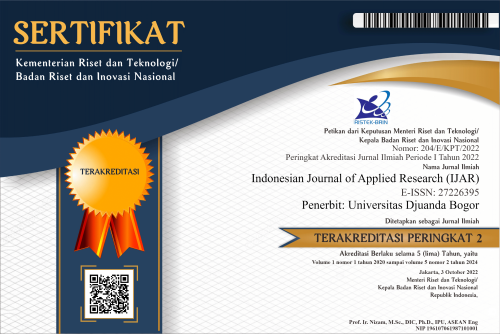Ethanol Blend Effects on The Spray Properties of a Biodiesel Fuel by Ambient Pressure Variation
Abstract
Diesel engine spray nozzles are crucial to pollutant generation and engine efficiency. Nozzle performance can be enhanced by adjusting the nozzle's internals. A successful demonstration of the nozzle would be one in which the spray's outcome was uniformly dispersed throughout a wide area, with the grains scattered similarly. The purpose of this research was to examine how a diesel-ethanol characteristic under normal atmospheric pressure (spray tip penetration, the velocity of spray, and spray angle) and, in general, to assess the performance of biodiesel fuel on diesel engines, a substantial amount of biodiesel and operational expenses for the engine are necessary. It was an experimental approach to the study. The research involved recording spray fuel at the nozzle. Using a 480 fps high-speed camera, we tested BD20, BD20E5, and BD20E10 fuel at three different ambient pressures (1 bar, 2 bar, and 3 bar). The injection pressure was 15 MPa, and the fuel temperature was 28.2 degrees Celsius. Spray tip penetration and spray velocity decreased and spray angle increased after ethanol was added to the mixture, consistent with the studies' findings. Lowered spray tip penetration, slower spray speeds, and a complete spray angle result from the increased ambient pressure.
References
Addepalli, S. K., Pamminger, M., Scarcelli, R., & Wallner, T. (2021). Numerical Investigation of the Impact of Spray – Bowl Interaction on Thermal Efficiency of a Gasoline Compression Ignition Engine. ASME 2021 Internal Combustion Engine Division Fall Technical Conference. https://doi.org/10.1115/icef2021-67851
Alifuddin, T., Hakim, L., Ilminnafik, N., & Nurkoyim, M. (2020). Karakteristik Penyemprotan Campuran Diesel-Biodiesel Minyak Nyamplung dan Etanol Dengan Variasi Tekanan Injeksi. 11(1), 374–380.
Anhar, W., Rahmawaty, P., Hermansyah, H., Bayu, S., & Wishnu, P. (2016). Karakteristik Bahan Bakar Diesel Dengan Penambahan Etanol, Dan Metanol. JTT (Jurnal Teknologi Terpadu), 4(2), 66–70. https://doi.org/10.32487/jtt.v4i2.168
Aydın, F., & Öğüt, H. (2017). Effects of using ethanol-biodiesel-diesel fuel in single cylinder diesel engine to engine performance and emissions. Renewable Energy, 103, 688–694. https://doi.org/10.1016/j.renene.2016.10.083
Corral-Gómez, L., Rubio-Gómez, G., Martínez-Martínez, S., & Sánchez-Cruz, F. (2019). Effect of diesel-biodiesel-ethanol blends on the spray macroscopic parameters in a common-rail diesel injection system. Fuel, 241, 876–883. https://doi.org/10.1016/j.fuel.2018.12.081
Geng, L., Bi, L., Li, Q., Chen, H., & Xie, Y. (2021). Experimental study on spray characteristics, combustion stability, and emission performance of a CRDI diesel engine operated with biodiesel–ethanol blends. Energy Reports, 7, 904–915. https://doi.org/10.1016/j.egyr.2021.01.043
Hou, J., Zhang, H., An, X., Tian, G., & Yan, X. (2021). Experimental study on dynamic injection behaviors of biodiesel and its blends in a common-rail injection system. Proceedings of the Institution of Mechanical Engineers, Part C: Journal of Mechanical Engineering Science, 235(1), 179–189. https://doi.org/10.1177/0954406220932954
Jaat, M., Khalid, A., Sapit, A., Basharie, S. M., Andsaler, A. R., & Ramsy, H. (2015). Effects of temperature and ambient pressure on spray characteristics of biodiesel combustion. 773, 501–505. https://doi.org/10.4028/www.scientific.net/amm.773-774.501
Jaat, N., Khalid, A., Mustaffa, N., Zulkifli, F. H., Sunar, N. M., Nursal, R. S., Mohamad, M. A. H., & Didane, D. (2019). Analysis of injection pressure and high ambient density of biodiesel spray using computational fluid dynamics. CFD Letters, 11(1), 28–39. https://doi.org/10.37934/cfdl.12.5.3651
Kandasamy, S. K., Selvaraj, A. S., & Rajagopal, T. K. R. (2019). Experimental investigations of ethanol blended biodiesel fuel on automotive diesel engine performance, emission and durability characteristics. Renewable Energy, 141, 411–419. https://doi.org/10.1016/j.renene.2019.04.039
Kim, K., & Lim, O. (2020). Investigation of the spray development process of gasoline-biodiesel blended fuel sprays in a constant volume chamber. Energies, 13(18), 4819. https://doi.org/10.3390/en13184819
LeBlanc, S. (2019). Spray Characteristics of Dimethyl Ether in a Direct Injection Application. University of Windsor, Canada.
Lee, S., Lee, C. S., Park, S., Gupta, J. G., Maurya, R. K., & Agarwal, A. K. (2017). Spray characteristics, engine performance and emissions analysis for Karanja biodiesel and its blends. Energy, 119, 138–151. https://doi.org/10.1016/j.energy.2016.12.043
Paendong M., Hanny F. Sangian, M. D. B. (2019). Pembuatan Bahan Bakar Campuran Biodiesel, Diesel, Etanol, dan Air dalam Emulsi Stabil. Pharmacon, 8((4)), 904–910. https://doi.org/10.35799/pha.8.2019.29368
Pang, K. M., Jangi, M., Bai, X.-S., Schramm, J., Walther, J. H., & Glarborg, P. (2019). Effects of ambient pressure on ignition and flame characteristics in diesel spray combustion. Fuel, 237, 676–685. https://doi.org/10.1016/j.fuel.2018.10.020
Waluyo, B., Setiyo, M., & Wardana, I. (2020). The role of ethanol as a cosolvent for isooctane-methanol blend. Fuel, 262, 116465. https://doi.org/10.1016/j.fuel.2019.116465
Zaharin, M., Abdullah, N., Najafi, G., Sharudin, H., & Yusaf, T. (2017). Effects of physicochemical properties of biodiesel fuel blends with alcohol on diesel engine performance and exhaust emissions: A review. Renewable and Sustainable Energy Reviews, 79, 475–493. https://doi.org/10.1016/j.rser.2017.05.035
Zhang, P., & Wang, B. (2017). Effects of elevated ambient pressure on the disintegration of impinged sheets. Physics of Fluids, 29(4), 042102. https://doi.org/10.1063/1.4981777
Copyright (c) 2023 Indonesian Journal of Applied Research (IJAR)

This work is licensed under a Creative Commons Attribution-ShareAlike 4.0 International License.
The Authors submitting a manuscript do so on the understanding that if accepted for publication, copyright publishing of the article shall be assigned/transferred to Indonesian Journal of Applied Research (IJAR) Universitas Djuanda as Publisher of the journal. Upon acceptance of an article, authors will be asked to complete a 'Copyright Transfer Agreement'. An e-mail will be sent to the corresponding author confirming receipt of the manuscript together with a 'Copyright Transfer Agreement' form by online version of this agreement.
Indonesian Journal of Applied Research (IJAR) Universitas Djuanda, the Editors and the Editorial Board make every effort to ensure that no wrong or misleading data, opinions or statements be published in the journal. In any way, the contents of the articles and advertisements published in the Indonesian Journal of Applied Research (IJAR) Universitas Djuanda are sole and exclusive responsibility of their respective authors and advertisers.
Remember, even though we ask for a transfer of copyright, our journal authors retain (or are granted back) significant scholarly rights as mention before.
The Copyright Transfer Agreement (CTA) Form can be downloaded here: Copyright Transfer Agreement-IJAR 2020
The copyright form should be signed electronically and send to the Editorial Office e-mail below:
Prof. Dr. Ir. Dede Kardaya, M.Si. (Editor-in-Chief)
Universitas Djuanda
Jl. Tol Jagorawi No.1, Ciawi, Kec. Ciawi, Bogor, Jawa Barat 16720
Website: http://journal.unida.ac.id/index.php/IJAR/index
Email: ijar@unida.ac.id







 This work is licensed under a
This work is licensed under a 